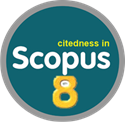Accounting Students Ethics Perception: the Role of Spiritual Intelligence, Ethics Knowledge, and Love of Money
Abstract
This study aims to prove the influence of spiritual intelligence, knowledge of ethics, and love of money on students' perceptions of ethics. This research was conducted by distributing questionnaires to accounting students. The research population is accounting students in the 7th semester of the National Veterans Development University of East Java with a total of 305 people. Of these, 75 people were the research sample selected by the convenience sampling method. By using multiple regression analysis assisted by SPSS, the results of the study prove that spiritual intelligence and ethical knowledge have a positive effect on ethical perceptions of accounting students, while love of money has a negative effect on ethical perceptions of accounting students. This research implies that in accounting student education, it should be done with the aim of increasing emotional intelligence and ethical knowledge. The researcher suggests that in further research, independent variables should be added, and the research respondents are not only at one university, but at several universities so that the research results can be generalized.
Downloads
References
Abdurahman, N. L., & Hidayatulloh, A. (2020). Kecerdasan, Religiustas, Kecintaan terhadap Uang dan Persepsi Etis Mahasiswa Akuntansi Universitas Ahmad Dahlan Yogyakarta. Jurnal Aplikasi Akuntansi, 4(2), 211–225. doi:10.29303/jaa.v4i2.75
Afriani, M., Askandar, n. S., & Mahsuni, A. W. (2019). Pengaruh Gender, Ethical Sensitivity, Locus of Control, dan Pemahaman Kode Etik Profesi Akuntan terhadap Perilaku Etis Mahasiswa Akuntansi Universitas Islam Malang. E-JRA: Jurnal Ilmiah Riset AKuntansi, 12-28. Diambil kembali dari http://riset.unisma.ac.id/index.php/jra/article/view/3776
Anis, S. (2017). Pengaruh Kecerdasan Intelektual (IQ), Kecerdasan Emosional (EQ),Dan Kecerdasan Spiritual (SQ) Terhadap Sikap Etis Mahasiswa Akuntansi (Studi Pada Perguruan Tinggi Negeri Dan Swasta Di Jakarta). Menara Ilmu, XI(77), 18–24.
Aziz, T. I., & Taman, A. (2015). Pengaruh Love of Money dan Machiavellian terhadap Persepsi Etis Mahasiswa Akuntansi (Studi Empiris Pada Mahasiswa Akuntansi UNY Angkatan 2013 dan Angkatan 2014). Nominal Barometer Riset Akuntansi dan Manajemen, 4(2), 31-44. doi:10.21831/nominal.v4i2.7998
Baskoro, Jatiningsih, A., & Sekar, D. E. (2020). The influence of Internal Locus of Control, Idealism, Ethical Knowledge, and Gender on Accounting Students’ Ethical Perception. 4th International Conference on Sustainable Innovation (ICOSI) (hal. 167-173). Yogyakarta: UMYPress.
Borkowski, S. C., & Ugras, Y. J. (2004). Business students and ethics: A meta-analysis. doi:10.1023/A:1005748725174
Cahyana, A. (2020, Mei 15). Manfaatkan Celah dalam Aplikasi KFC, Mahasiswa di China Rugikan Perusahaan hingga Rp443 Juta. Dipetik Mei 20, 2020, dari Bekasi.pikiran-rakyat.com: https://bekasi.pikiran-rakyat.com/internasional/pr-121915416/manfaatkan-celah-dalam-aplikasi-kfc-mahasiswa-di-china-rugikan-perusahaan-hingga-rp443-juta?page=2
Elias, R. Z. (2016). The impact of professional commitment and anticipatory socialization on accounting students’ ethical orientation. Journal of Business Ethics, 68(1), 83–90.
Hartatik, N. K., & Susilowati, E. (2018). Analisis Asosiasi Love of Money, Iklim Etis Organisasi dan Spiritualitas terhadap Earnings Management Motivation. BAJ (Behavioral Accounting Journal), 1(2), 212-229. doi:10.33005/baj.v1i2.33
Heider, F. (2019). Perceiving the Other Person. Social Cognition, 15, 33–35.
Hermawan, S., & Nurlia, W. (2017). Dapatkah Love Of Money Sebagai Variabel Intervening Pengaruh Variabel Kecerdasan Terhadap Persepsi Etis Mahasiswa Akuntansi. JIAB: Jurnal Ilmiah Akuntansi dan Bisnis, 12(2), 93-103. doi:10.24843/JIAB.2017.v12.i02.P04.
Latif, S. A., & El-Fikri, A. (2017). Super Spiritual Quotient (SSQ): Sosiologi Berpikir Qur`'ani dan Revolusi Mental. Jakarta: PT. Elex Media Komputindo.
Nahumury, J., Utama, I. W., & Suryaningrum, D. H. (2018). The Compliance of Motor Vehicle Taxpayers: An Experimental Research. Journal of Accounting and Strategic Finance (JASF), 1(2), 163-176. Diambil kembali dari https://doi.org/https://doi.org/10.33005/jasf.v1i2.44
Perdana, K. E. (2016). Olah Data Skripsi Dengan SPSS 22. Bangka-Belitung: Lab Kom Manajemen FE UBB.
Riasning, N. P., Kade, L., Made, D. I., Putra, W., Ekonomi, F., & Warmadewa, U. (2017). Pengaruh kecerdasan intelektual, kecerdasan emosional dan kecerdasan spiritual terhadap sikap etis mahasiswa akuntansi di kota Denpasar. Krisna: Kumpulan Riset Akuntansi, 9(1), 50–56. Diambil kembali dari https://www.ejournal.warmadewa.ac.id/index.php/krisna/article/view/328
Sugiyono. (2019). Metode Penelitian Kuantitatif, Kualitatif, dan R&D. Bandung: Alfabeta.
Supartha, W. G., & Sintaasih, D. K. (2017). Pengantar Perilaku Organisasi: Teori, Kasus, dan Aplikasi Penelitian. Denpasar: CV. Setia Bakti. Diambil kembali dari https://simdos.unud.ac.id/uploads/file_pendidikan_1_dir/b9ca64feeb1d962d5d06f51ea4d7577b.pdf
Tang, T. L., Chen, Y. J., & Sutarso, T. (2008). Bad apples in bad (business) barrels: The love of money, machiavellianism, risk tolerance, and unethical behavior. Management Decision, 46(2), 243–263.
Teoh, H. Y., Serang, D. P., & Lim, C. C. (1999). Individualism-Collectivism Cultural Differences Affecting Perceptions of Unethical Practices: Some Evidence from Australian and Indonesian Accounting Students. Teaching Business Ethics, 3(2), 137–153.
Wati, M., & Sudibyo, B. (2016). The Influence of Business Ethics Education and Religiosity to Ethical Perception of College Students . Jurnal Economia, 12(2), 183-201. doi:10.21831/economia.v12i2.11775
Wijaya, C. H. (2017). Perilaku Organisasi. (N. S. Chaniago, Penyunt.) Medan: LPPPI (Lembaga Peduli Pengembangan Pendidikan Indonesia). Diambil kembali dari http://repository.uinsu.ac.id/2838/1/Perilaku%20Organisasi.pdf
Wong, H. M. (2008). Religiousness, love of money, and ethical attitudes of Malaysian evangelical Christians in business. Journal of Business Ethics, 81(1), 169-191. Diambil kembali dari https://www.academia.edu/6010366/Wong_H_M_2008_Religiousness_love_of_money_and_ethical_attitudes_of_Malaysian_evangelical_Christians_in_business_Journal_of_Business_Ethics_81_1_169_191
Yustrida, B., & Napitupulu, G. B. (2018). The Effect of Organizational, Individual, and Demographic Factors on the Whistle-blowing Intention. Journal of Accounting and Strategic Finance, 1(1), 1-12. doi:10.33005/jasf.v1i01.21
Zohar, D., & Marshall, L. (2007). SQ: Kecerdasan Spiritual. (R. Astuti, A. N. Burhani, & A. Baiquni, Penerj.) Bandung: PT. Mizan Pustaka.
Copyright (c) 2020 Endah Susilowati, Sari Andayani, Khalifah Venty Zaana

This work is licensed under a Creative Commons Attribution 4.0 International License.














